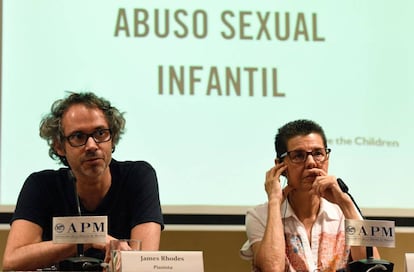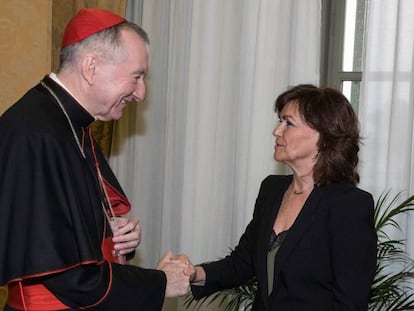Spain unveils plans to increase statute of limitations on sex offenses
In response to demands from children’s organizations, victims will be able to report abuse until at least the age of 40


The time period during which sex offenders can be brought to justice will start to run from the moment the victim reaches the age of 30, and not 18 as the law in Spain currently dictates. That’s according to one of the proposals that the Spanish Cabinet approved last week in the draft bill of the Integral Protection of Childhood and Adolescence against Violence Law.
The reform is in response to demands from sexual abuse victims, although it falls short of calls from children’s organizations, which wanted the statute of limitations to start running when the victim reaches the age of 50.
The reform also proposes that victims under the age of 14 should not have to give evidence in court more than once – children’s organizations have requested that the age limit here be raised to 16.
The reform also proposes that victims under the age of 14 should not have to give evidence in court more than once
During a visit to the Vatican in October, during which she addressed child abuse within the Catholic Church, Spain’s deputy prime minister, Carmen Calvo, offered assurances that the Spanish government was working to ensure that there would be no statute of limitation on such offenses.
The draft law proposes a statute of limitations of between 10 and 20 years once the victim turns 30, depending on the seriousness of the offense. This means that victims can be confident that a crime reported when they are aged between 40 and 50 will still proceed to court.
Children’s organizations have been demanding the limitation period be extended given that the majority of victims tend to take time to process the abuse and feel able to speak about it, essentially allowing offenders to escape justice.
Government sources point out that, in practice, the reform guarantees Calvo’s promise that there will be no statute of limitation.
The government is also proposing increased sentences for sex offenders, while those convicted in cases involving minors will not be eligible for parole or better conditions for good behavior until they have completed half their sentence.
The draft, which could reach parliament by February, proposes amendments to 11 laws, including other demands from children’s organizations such as the obligation to take evidence produced before the trial into account. This means that children will only be required to give evidence once during the preliminary hearing. According to the NGO Save the Children, some minors have been obliged to appear in court up to four times, which can be hugely traumatic for victims.
Organizations have been demanding the limitation period be extended given that the majority of victims tend to take time to process abuse
Children’s associations want the age limit on this raised from 14 to 16, while making it applicable to those with disabilities and particularly vulnerable victims, according to the judge’s discretion.
Measures will also be adopted to avoid indirect victimization of minors that might result from the trauma of the judicial process. In this case, provisional measures will be immediately adopted, meaning that only procedures considered absolutely necessary will be undertaken and any contact between the victim and the aggressor strictly avoided. Children’s organizations have repeatedly asked for judges specializing in cases of violence against minors to deal with such processes.
The government’s draft contains a broad definition of violence covering all physical, psychological and emotional abuse, including beatings, sexual abuse, physical punishments and negligence. And a whole new array of online crimes against minors and adolescents is to be included in the penal code, such as inciting suicide, self-harm, crimes against freedom and sexual integrity as well as the promotion of eating disorders.
The draft also proposes the creation of security units specialized in prevention, detection and protection with regard to the abuse of minors.
The judge will also be entitled to withdraw illegal content from websites as a precautionary measure during an investigation. With regard to any sex crime, the sentence will imply the withdrawal of access to any profession that involves regular and direct contact with young people.
The draft also proposes the creation of security units specialized in prevention, detection and protection with regard to the abuse of minors
The draft specifies that anyone who suspects abuse has a duty to report it and that confidentiality will be guaranteed. The draft also goes into specific protocols that should be implemented in schools, health clinics and sports and entertainment centers while the protocols in hospitals will be expanded and under the jurisdiction of regional authorities. Health records will also include any abuse against minors.
Schools will be equipped with protocols in the case of bullying, cyber bulling, sexual abuse, gender abuse and any other form of violence and will have a welfare officer in charge of their correct application.
Meanwhile, social workers will have the authority to adopt the necessary protection measures by coordinating the resources at their disposal, including medical and police security. A central record will also be kept of child abuse cases.
New warning signs
The draft bill of the Integral Protection of Childhood and Adolescence against Violence Law approved by the Cabinet on Friday lays out a list of warning signs indicating that a child is at risk – currently, legislation on the issue is much vaguer.
These signs include the lack of alternative housing in the case of eviction and long-term conflict between a child’s parents, or between the parents and the child’s teachers. Also included are discriminatory practices by the parents against children or adolescents that pose a risk to their wellbeing and health, such as the failure to accept a child’s sexuality or disability.
The draft states that the authorities should intervene when a risk scenario presents itself without the minor having to be removed from the family environment.
The draft includes more than 20 warning signs. Others include placing a child in aversion therapy should they identify with the LGBTI community, the use of physical or psychological punishment and the use of violent correctional methods,
Physical punishment in Spain is already against the law. What is new in the draft is that it should be seen as a sign that the child is at risk on a deeper level.
Exposing the child to public opinion by posting his or her image or personal information online or otherwise is also considered a warning sign, as is absenteeism, early pregnancy and mothers who are victims of gender abuse. A further warning sign is a minor under the age of 14 committing a criminal offence.
English version by Heather Galloway.










































